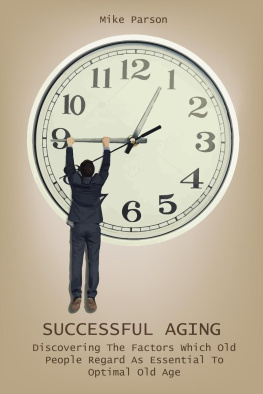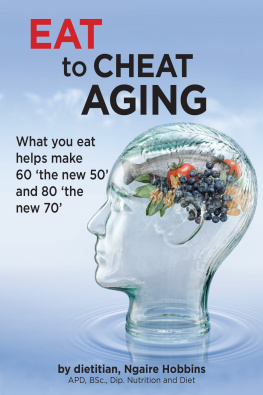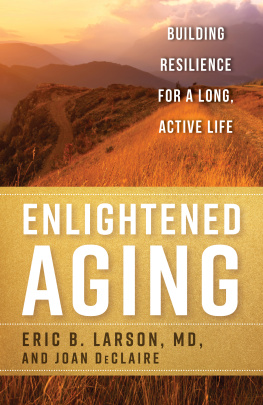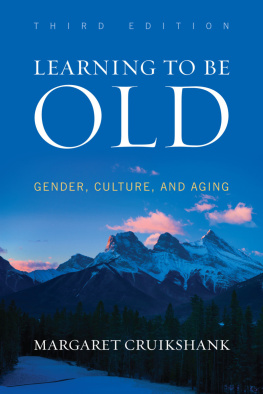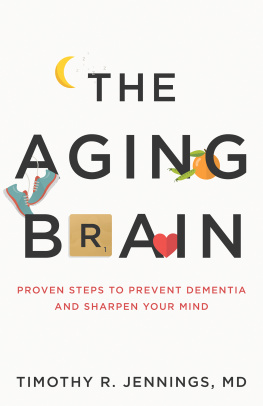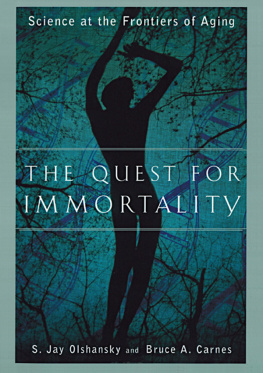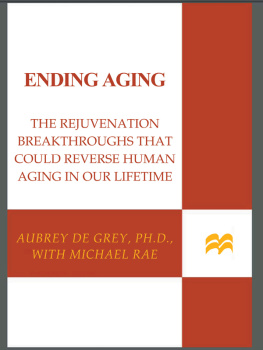The Art and Science of Aging Well
This book was published with the assistance of the Lilian R. Furst Fund of the University of North Carolina Press.
2016 Mark E. Williams, M.D.
All rights reserved
Set in Arnhem and TheSans
by codeMantra
Manufactured in the United States of America
The University of North Carolina Press has been a member of the Green Press Initiative since 2003.
Library of Congress Cataloging-in-Publication Data
Names: Williams, Mark E.
Title: The art and science of aging well : a physicians guide to a healthy body, mind, and spirit / Mark E. Williams, M.D.
Description: Chapel Hill : The University of North Carolina Press, [2016] | This book was published with the assistance of the Lilian R. Furst Fund of the University of North Carolina Press. | Includes bibliographical references and index.
Identifiers: LCCN 2016004041| ISBN 9781469627397 (cloth : alk. paper) | ISBN 9781469627403 (ebook)
Subjects: LCSH: AgingPsychological aspects. | AgingPhysiological aspects. | Memory in old age.
Classification: LCC BF724.55.A35 W6155 2016 | DDC 612.6/7dc23
LC record available at http://lccn.loc.gov/2016004041
To my wife, Jane, and our sons, John and James
Contents
Illustrations
1 Estimated survival curves for the U.S. population
2 Chart to calculate body mass index from height and weight
3 Standardized mortality by body mass index and age
4 Egyptian hieroglyph for old age
5 The effects of age on organ function
6 Glycemic index and portion size for select foods
7 Types and benefits of exercise
8 The parts of the right side of the brain superimposed on Michelangelos fresco
9 Types of memory based on aspects of brain function
10 Flowchart of human memory
11 Michelangelos Piet
12 Michelangelos Deposition
13 The Fountain of Youth by Lucas Cranach the Elder
Preface
Begin at the beginning, the King said, very gravely, and go on till you come to the end: then stop.
Lewis Carroll, Alices Adventures in Wonderland
You only live once, but if you do it right, once is enough.
Mae West
We are often led to believe that aging is something that simply happens. You might lose your memory, or you might stay sharp. You might remain strong, or you might wither and weaken. You might enjoy yourself, or you might be miserable. But while many things are indeed beyond our control in life, the truth is that we have considerable choice in determining the quality of our own old age.
My aim in writing this book is to offer a more accurate, realistic, and helpful portrait of human aging than what you have likely encountered in the mass media, in the workplace, in our broader culture, and perhaps in your own inner thoughts and fears. What we are up against is ageismthe mistaken belief that all old people are the same and that they are falling apart. Buying into this destructive myth causes personal, social, economic, and health care tragedies. The relentless focus on preserving our youth devalues the personal and social significance of old age and robs us of many of the diverse pleasures that aging can bring.
This book does not advocate for a certain type of old age, and it does not propose a new norm of aging. Rather, it endeavors to provide practical and philosophical insights that I hope will help you face down ageism, find opportunities for personal growth, and approach your own aging with optimism and perhaps even joy. Through observations of the diversity of experiences that come with aging, this book celebrates our intrinsic value as human beingsa value that does not diminish with the passage of time.
I came to write this book because I have seen way too many people shortchange themselves of the old age they deserve. For nearly four decades I have been a practicing physician in the field of geriatrics, the care of elderly peopleindeed, I am part of one of the first cohorts of American doctors formally trained in that medical specialty when it emerged in the late 1970s. My patients, who average eighty-three years of age, come to me for help and guidance as they navigate the physical and emotional changes that accompany growing old. I have had the privilege of knowing many inspiring older people who take life by the horns, continuing to work, play, create, and smile until their last days. But I have also seen far too many peoplemisinformed about aging and about the incredible opportunities around themlimiting themselves unnecessarily simply because of their age. This needless loss of human potential and productivity is staggering. I conceived of this book as an effort to help more people overcome societys biases and enjoy full, productive livesall the way to the very end.
Before we begin, curious readers may want to get to know me a bit better. I grew up in the rural South in a very small hometown community where people spoke to each other on the street and sat on the front porch or took long walks after supper. As a child I pored over the perception puzzles in my favorite magazine, Highlights for Children, and voraciously consumed the entire canon of Arthur Conan Doyles Sherlock Holmes stories. I discovered at a young age the enchantment of performing magic, a hobby I have continued to foster to this day. Looking back, I realize that throughout my childhood passions ran a common thread: a fascination with mystery and the distinction between how things appear to be and how they actually are.
I found myself dwelling in this appearance-versus-reality distinction again when I gained a liberal arts education and then went on to pursue medical training. As a young medical student I began to feel an uneasiness, that something was not quite right. The mid-1970s had seen major scientific and medical advances with great promise to relieve human suffering, but the application of this knowledge was often ineffective, especially in the treatment of elderly people. I saw far too many instances where old people were not being treated as people.
A two-year stint as a Robert Wood Johnson Clinical Scholar crystallized my sense of social responsibility and solidified my resolve to improve medical care for older people. My research interest focused on understanding the epidemiology of dependency: Why did some people go into nursing homes while others with similar diseases did not? Is there a subset of skills we all need to maintain our independence? I created an original testing protocol that timed individuals as they performed twenty-seven simple manual tasks chosen to reflect the skills we need to live independently. For example, subjects would use a teaspoon to transfer dried kidney beans from one bowl to another to simulate eating. Other tasks involved opening various locks and latches. To summarize over twenty years of my research life, the total time it takes an individual to perform these basic tasks is intimately associated with that persons future need for nursing home care. Individuals who take an excessive amount of time are at high risk to enter long-term care, whereas those who are quick and efficient are at low risk regardless of the diseases on their medical problem list.
After beginning that research adventure I decidedwith the full support of my loving wife, to whom I am eternally gratefulto pursue a career in geriatric medicine. I thus became one of the first physicians in America to receive formal fellowship training in this area. At the time the decision was a bold one, and more than once I heard instructors, colleagues, and friends questioning my judgment. What is a person like you going to do in geriatric medicine? Interestingly, several of my most vocal skeptics have since migrated into geriatrics careers.
Within a decade I was offered the best job in the country: developing the geriatric medicine program at my alma mater, the University of North Carolina. Another extraordinary stroke of good fortune placed my new office adjacent to Dr. Mack Lipkin Sr., one of the giants of clinical medicine who had retired to North Carolina to continue his teaching and writing. We established a close friendship, shared clinical perspectives, and had many conversations and tuna fish sandwiches. I was stunned when Dr. Lipkin asked me to be his personal physician. Our relationship deepened, and I was honored to share the personal insights and perceptions of a wise, sensible, and articulate physician. Over time I came to know the aging process intimately by witnessing it in Dr. Lipkin, in my hundreds of other geriatric patients, and in myself.
Next page

